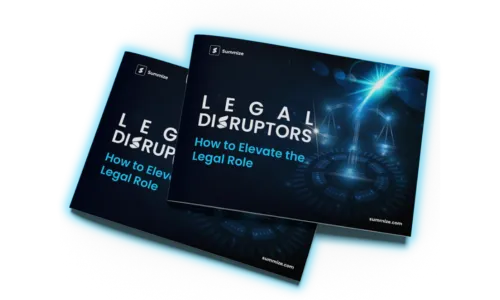The legal industry in the Metaverse
Tom Dunlop (CEO and Founder of Summize) speaks to Electra Japonas (CEO and Founder of The Law Boutique) about the impact of the metaverse on the legal industry.
May 3, 2022
December 19, 2025
The latest episode of Legal Disruptors brings together two pioneers reshaping the legal industry: Electra Japonas, founder of The Law Boutique, and Tom Dunlop, CEO of Summize. Both guests have made a mark in legal innovation, challenging traditional methods and exploring how technology and smarter processes can transform the way legal services are delivered. Graeme Smith hosts the conversation, diving into the personal journeys, challenges, and insights of these legal disruptors.
From in-house lawyers to innovative CEOs
Electra Japonas spent a decade working as an in-house lawyer before launching The Law Boutique. Frustrated by siloed teams and processes that limited the impact of legal departments, she envisioned a more integrated, user-centric approach. “I realized that one of the reasons that in-house legal wasn't really able to add the value it could was the way it worked,” she explains. Her solution? A business that brings legal to the center through legal design, legal operations, and smarter ways of working.
Tom Dunlop, meanwhile, transitioned from a similar in-house background to founding Summize. He highlights the creative freedom entrepreneurship offers:
I like the freedom of not always having to be the downside and risk voice.
Both CEOs share that leaving the comfort of structured feedback in traditional roles was daunting, but the autonomy and ability to implement their vision outweighed the challenges.
Scaling legal services through technology
A central theme of the discussion is the resistance lawyers have historically shown toward technology. Electra points out that “old school lawyers…think that everything they do is really special and needs to be done manually.” Tom adds that the traditional legal industry often rewards inefficiency, making change difficult. However, both agree that scaling legal services through standardization and tech solutions is no longer optional, it’s essential.
Their respective ventures tackle this challenge differently. Electra emphasizes collaboration through platforms like Claustack, where lawyers can share knowledge and create common standards. Tom highlights how Summize simplifies contract processes to integrate seamlessly into wider business operations. Both see technology not as a replacement for legal expertise, but as a tool to amplify it.
Legal-first approaches and business impact
Another key insight from the podcast is the importance of embedding legal processes within broader business strategy. Tom notes that legal departments are often misunderstood as bottlenecks, but when businesses understand their role, they become central to value creation. Electra agrees, observing that organizations with a “legal-first” mindset, particularly scale-ups and startups, tend to succeed because they prioritize human-centric and collaborative legal practices. The consensus is clear: legal teams are not just a support function, they are integral to business success.
Building a personal brand alongside a business
Both guests also reflect on the role of personal branding in modern legal entrepreneurship. Electra advises using social media thoughtfully, particularly LinkedIn, to align personal image with business values without becoming tied to a single narrative. Tom echoes this, emphasizing that a personal brand is most effective when tied to a broader vision rather than isolated messaging. For both, credibility, relatability, and demonstrating tangible problem-solving are more important than flashy self-promotion.
Final thoughts
The conversation with Electra Japonas and Tom Dunlop offers a fascinating glimpse into the evolving legal landscape. From scaling services with technology to adopting a legal-first business mindset and navigating the challenges of entrepreneurship, their insights are invaluable for anyone interested in legal innovation.
For a deeper dive into their journeys, strategies, and reflections on the future of law, listen to the full Legal Disruptors episode at the start of the article, and to hear more insights from our Legal Disruptors, explore our Legal Disruptors Hub below.
Discover even more!
Explore more about contracting and CLM in our ultimate contract guides








